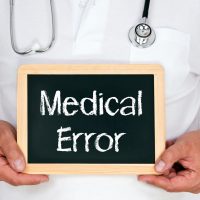Surgical Errors

Thousands of patients have surgery each year with complete success. However, every surgery carries some risk, and patients typically sign a release form indicating they have knowledge that there may be unexpected complications either during or after the surgery. No surgery or medical procedures should ever include errors that are preventable. Unfortunately, many patients are injured every year due to wrong-site surgeries or surgical errors by medical professionals. Any slight deviations from medical standards can result in catastrophic injuries or death.
Types of Surgical Errors
Surgical errors are mistakes that are made by a medical professional in the course of their actions during surgeries or medical procedures that could be avoided. These errors can result in minor issues that only require a patient to take over-the-counter pain medications and rest, to catastrophic incidents that result in paralysis or death. Some of the most commonly known surgical errors are when a surgeon performs surgery on the wrong area of the body, leaves surgical equipment inside of a person, damages nerves during surgery, cuts the wrong area or uses an incorrect amount of anesthesia.
Establishing Negligence
In order to prove a case of medical malpractice related to a surgical error, the victim must provide evidence to the court that the medical error directly resulted in additional medical complications, pain and suffering or death. Oftentimes, medical records, expert medical witnesses, or eyewitnesses to the surgery are required to build a strong personal injury and medical malpractice case. However, in many cases of medical malpractice in a surgical setting, a patient has no idea that they were harmed immediately after surgery, or they are in pain but believe that it is a normal response to the surgical procedure. Only later do they find out that they were harmed in some way. In these cases where the patient does not discover that they were injured until later, the statute of limitations begins when the patient knew or should have known that they were injured as a result of medical malpractice.
The doctrine of “res ipsa loquitur” states that if the patient’s result could not have happened without some sort of negligent action, no further proof is required to prove their case. Instead, the burden to prove that there was no medical negligence shifts to the physician. This is a powerful legal tool if you have been injured in a surgery or a medical procedure. Visiting with an experienced attorney can help you understand if this legal doctrine would apply in your case.
Let Us Help You Today
If you had a surgery or medical procedure and were injured due to the negligence of a doctor or another medical professional, you may have the right to receive compensation for your injuries. Medical malpractice claims can be legally complex and challenging and may necessitate expert witnesses or testimony from those who witnessed the surgery. Contact an experienced Columbia personal injury attorney at The Stanley Law Group at 803-799-4700. We can help you understand your legal rights, and help you build a strong case for a fair settlement for the injuries you suffered.
Resource:
law.cornell.edu/wex/res_ipsa_loquitur
ncbi.nlm.nih.gov/books/NBK2678/
https://www.thestanleylawgroup.com/medical-malpractice-and-hospital-acquired-conditions/

